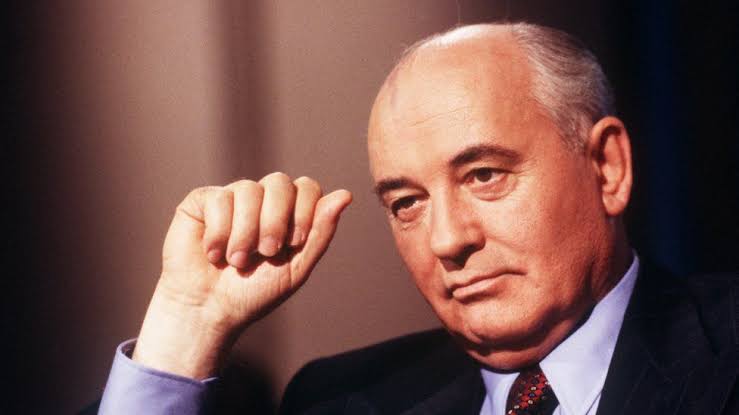The last Soviet leader will be remembered for changing the course of the 20th Century.
by Shome Basu
As the news of Mikhail Gorbachev’s passing flashed on the TV screen, I couldn’t help reminiscing about the piece of the Berlin Wall beside the River Mosel in Luxemburg, bordering France and Germany in Shenghen, where Gorbachev’s graffiti has ’The Hero Of Peace’ splashed across it.
Gorbachev who led a long, eventful life redefined the course of the 20th Century. Born on March 2, 1931 in USSR, he was a thoughtful political leader. He helped in tearing the Iron Curtain, pulled back the military from Afghanistan and ended the Cold War. The West was happy, so was the rest of the world. But the effects of the Cold War never ended. They trickled down to South Asian countries of India and Pakistan with Kashmir becoming the laboratory.
When Gorbachev came to power as the General Secretary of the Communist party of USSR, he was carrying a heavy baggage of Afghan war which had begun five years back. When he took over the highest office in Kremlin, President Gorbachev had a to-do list which explicitly had exit From Afghanistan on it. By then, thirteen thousand coffins made of zinc and filled with bodies of soldiers killed in Afghanistan had traveled to far away village in USSR as the war took lives of millions, with millions of Afghan refugees crossing the Durand line into Pakistan.
Gorbachev knew it was a no-gain war in which USA was providing the covert supply of arms and finances while Pakistan’s ISI was doing all the legwork to keep the fires of the Afghan jihad burning. He got the sense from the newspaper editorials that people wanted no war but still in the midst of the Cold War, USSR and USA were at loggerheads in the land of the great game – Afghanistan.
Afghanistan’s President Babrak Karmal, a communist, was the first head of state who came to meet Gorbachev. Karmal wanted USSR’s support for his Communist ideology to fight against the Islamic mujahideen who saw Communism as an evil and wanted the Soviets out. Karmal was heard and then snubbed and told that USSR had given enough and they should find ways to have a mutual understanding among their own people and think about a power sharing proposal.
Despite Karma’s invocation that Afghanistan and Russia shared a ‘unique relationship’, Gorbachev had made up his mind to pull his men out from the killing fields of Afghanistan. Gorbachev’s biographer William Taubman, in his book Gorbachev, quotes the Soviet leader as saying: “Karmal thinks we need Afghanistan more than he does and clearly expects we will stay for a long time, if not forever.”
In 1986, he told the 27th Communist Party Conference that “counter revolution and imperialism has transformed Afghanistan into a bleeding ground.” The President was adamant to move out the boots and started a framework for the process of evacuation which took place on 15th February 1989.
But post withdrawal, USSR went on to provide financial assistance of $300 to Najeebullah’s government. Jack Matlock, then US ambassador to the USSR, a hawkish man, warned: “It was not Gorbachev’s war …but by not ending it he was making it his own.”
Gorbachev feared about the Warsaw Pact countries that were supported by the mammoth Soviet power machinery and also saw the backlash USSR was facing from the Islamic nations. The space was shrinking, he felt, while the US was increasing its share of the global pie. He was a bitter critic of the West especially the USA. He brushed off G W. Bush’s remark that “by the grace of God America has won the Cold War…”
The end of the war in Afghanistan and the dismemberment of the USSR changed the US stance in the new great game.
Mujahideen leaders, including Gulbaddin Heykmatyar and Jalaluddin Haqqani, started sending their men, at Pakistan’s behest to Kashmir. The guerilla war theatre had changed from Afghanistan to Kashmir. The nearly decade old war had turned Afghanistan into a massive reservoir of small and medium range weapons which was subsequently used against India when an armed movement was initiated in Kashmir.
Kashmiri youth crossed the LoC (Line of Control which divides Jammu & Kashmir among India-Pakistan) in droves to join training camps manned by Afghans under the patronage of Haqqani and Hekmatyar.
Gorbachev’s first Asian country visit was India and his fondness towards India’s PM Rajiv Gandhi was well articulated. Rajiv got elected to the office of Prime Minister after he lost his mother Indira Gandhi in 1984. She was assassinated by her own bodyguards in retaliation to Operation Blue Star on the holiest Sikh site, the Golden Temple of Amritsar. Gorbachev came to India on 26th November 1985, few months after Rajiv had assumed the office.
On the four-day visit, USSR signed to provide India advanced MIG 29s and T 72 Main Battle Tanks which were the advanced version of the previous T-55s.
Continuing to place the blame on Ronald Reagan, both leaders shared their thoughts on the then ongoing Cold War crisis. Gorbachev said: “The situation calls for a new approach to security issues, a new thinking in politics and a new philosophy in International Relations.”
In 1990, Gorbachev won the Nobel Peace Prize for his role in ending the Cold War. He will always be remembered for it was under him that the Berlin Wall came crumbling down. It was he who had thousands of political prisoners released, something that his predecessors in the erstwhile USSR, given to ruling with an iron fist, weren’t used to. He will always be remembered along with key figures of the 20th Century who redirected its course.
Shome Basu is a Delhi-based senior journalist.


